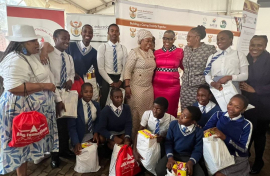Basic Education Deputy Minister, Dr Reginah Mhaule, has sent her appreciation to the Global Fund Adolescents and Young People (AYP) Programme for the donation of school uniforms, stationery packs, hygiene packs and water bottles to schools affected by the floods in KwaZulu-Natal.
The Deputy Minister, together with the Deputy Minister of Social Development, Hendrietta Bogopane-Zulu and MECs Mbali Frazer and Nonhlanhla Khoza, presided over the Global Fund Flood Relief Donation to affected schools in Amaoti on Monday.
Delivering the keynote address, Mhaule said that the Global Fund AYP Programme in South Africa offers a comprehensive package of social, structural and biomedical services to adolescent girls.
She said this package aims to improve the health, psychosocial and socio-economic well-being of adolescents and young people.
“We warmly accept this act of solidarity amid the devastation caused by the KwaZulu-Natal floods. This occasion today indeed reaffirms the importance of global solidarity.
“We consider the extension of a helping hand to our people as a sign that we are not alone in our hour of need. We appreciate the gesture and wish all organisations involved more success,” Mhaule said.
The aim of the Adolescents and Young People programme is to decrease HIV incidence, decrease teenage pregnancy, increase retention in school, increase economic opportunities and reduce gender-based violence (GBV).
“I recount the Global Fund’s core purpose to underscore the point that they are the natural partner to basic education. As government, we are seized with the issue of the rampant increase of HIV amongst young girls.
“According to statistics, HIV prevalence among females aged 15 to 19 years is currently 5.8% and peaks at 15.6% among those aged 20 to 24,” she said.
The Deputy Minister said incidents of teenage pregnancies are skyrocketing.
For April 2021 and March 2022, girls aged between 10 and 19 have recorded 90 000 pregnancies.
“As we sit here, we know that most of our youth are unemployed and unskilled. According to Stats SA, youth unemployment in South Africa is at a record 66.5%,” Mhaule highlighted.
She added that more depressing are the numbers of young people (37%) between the ages of 15 to 24 who are not in employment, education and training (NEET).
Statistics South Africa describes this group as “disengaged from the labour market” and defines them as “young people [who] are also not building on their skills base through education and training.”
She said that the KwaZulu-Natal young people have had to battle the effects of a triple whammy, the July riots, COVID-19 and the April and May floods which left more than 630 schools in distress.
Beyond the damage to school infrastructure, the Deputy Minister said the floods had a negative impact on the livelihoods of communities, learners included.
“In other words, it is a perfect storm negatively impacting young people here. It is within this context that we accept any intervention aimed at unlocking the potential of young people.
“Donating school uniforms, stationery packs, hygiene packs and water bottles to schools, particularly to learners will significantly ameliorate their suffering,” Mhaule said.
Mhaule mentioned that when they realised the sheer magnitude of the crisis in KwaZulu-Natal, they made an SOS call to the Global Fund (GF).
She announced that the Global Fund, through the South African National AIDS Council (SANAC) and its Principle Recipients (PRs), has joined in the collaborative effort of extending a helping hand to the affected learners.
“The Global Fund approved an amount of about R5, 000,000 from the AIDS Foundation South Africa (AFSA) for the purchasing school uniforms, stationery packs, hygiene packs and water bottles for the KZN schools affected by the floods,” she said.












